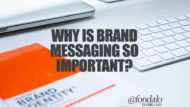As I have discussed for some time, B2B digital marketing is in a period of transition that is beginning to resemble something very similar to B2C digital marketing. It’s true that there are some substantial differences between business to business customers and retail consumer traits, but the line between how each customer type pursues purchases is getting more blurred. The customer journey of B2B buyers and the traditional retail consumer is converging, requiring B2B brands to modify how they approach their digital presence and the marketing tactics they use with prospects.
Is digital marketing blurring the lines between B2B and B2C marketing?
How has B2B marketing become much more reminiscent of traditional retail B2C marketing online?
B2B Digital Marketing Is Transforming
For at least two decades now, larger retail B2C brands have approached their digital marketing as at least an important part of what they do. Over this period, consumer brands have increasingly made their digital marketing components at least as important to their results as their other marketing channels, such as major media and print advertising. At the same time, small to medium-sized retail businesses have also committed to their online marketing resources through content creation, email marketing, website improvements and an advancing social media presence.
Due to the submersion of the online world into all of our lives, B2B decision makers have become accustomed to using digital elements as a part of their normal personal activities and we’re seeing that carried over into the business customer journey processes as well. Because B2B employees that make purchase decisions are indeed also humans, it is no surprise that how they now use digital channels in their personal lives is being carried over to their business activities. B2B brands are being forced to provide the digital marketing channels that consumers expect in a similar way for their business to business prospects.
B2B Marketing Becoming Just Like B2C
When we are working with a new B2B clients on their integrated digital marketing, we often spend a lot of time discussing and justifying the various digital marketing components we are proposing for their program. The fact is that many business to business brands just aren’t comfortable with some of the normal B2C marketing elements being utilized within their brand marketing, which is specifically designed to reach an exclusively business audience. A significant misunderstanding of the new digital marketing world, how their target audience uses online resources and introducing things that are very different from what they have always done is a hindrance to many B2B brands pressing forward toward improving their online marketing results.
Fortunately, we’ve been here before and are able to walk our clients through the real numbers surrounding the new B2B digital marketing expectations and standards for typical B2B brands of all sizes. The facts about B2B marketing closely aligning with how B2C digital marketing has been done for years is quite eye-opening.
Here are some intriguing B2B integrated digital marketing statistics from Forrester Research and a white paper produced by IBM called “The Convergence of the Enterprise Sales Model.” All of which support the transition of old school B2B marketing to something that much more closely resembles new B2B integrated digital marketing.
Let’s cover just a few of the most important B2B buyer statistics one at a time:
Search Is Important To B2B marketing also: In fact, 73% of all traffic around the world to B2B company sites, actually originates from search engines. This clearly shows the importance of an organic search engine marketing program that is actively producing content that B2B buyers are searching for.
B2B Prospects Are Doing Research Before Interaction With Sales: The Forrester research shows that a significant 57% of the buying process is done by B2B buyers prior to ever engaging with sales representatives. That means that just like retail consumers, B2B customers are following a very similar purchase journey that involves research before moving down the purchasing process.
Research Prior To Making Contact: The researching process is further defined in this B2B buyer statistic. 89% of B2B researchers use the Internet during the B2B research process. They use research to determine the brands that are providing what they need and evaluating them before deciding which to pursue conversations with.
B2B Brands Think The Expectations Have Changed: The IBM white paper notes that some 80% of B2B companies believe that their customer expectations have changed due to B2C marketing practices. So even your peers see the changes that are impacting the requirements of B2B marketing teams.
Social Media Matters For B2B Brands: 75% of the B2B buyers that were surveyed stated that they are indeed influenced by social media. It’s time that your brand change it’s thinking on when and how social media has a place within your brand and sales person efforts. Social media is now a normal part of both B2C and B2B marketing efforts and you are required to do it and do it well.
There is no longer any doubt that a highly integrated, multi-channel digital marketing program is every bit as important to the long-term success of the typical B2B brand as it has been for B2C brands for some time. A highly sophisticated digital marketing strategy that includes content marketing, video, email marketing, marketing automation, expected website features and social media integration are just a few of the components B2B buyers expect from brands of all types.
As B2B brands continue to digitally transform, there is a growing need to ramp up their digital marketing footprint. Digital transformation includes both internal and external components that elevate the company’s ability to scale, increase revenues and stay ahead of their competition. How well B2B brands implement the new requirements within their sales and marketing departments will determine their future success.






